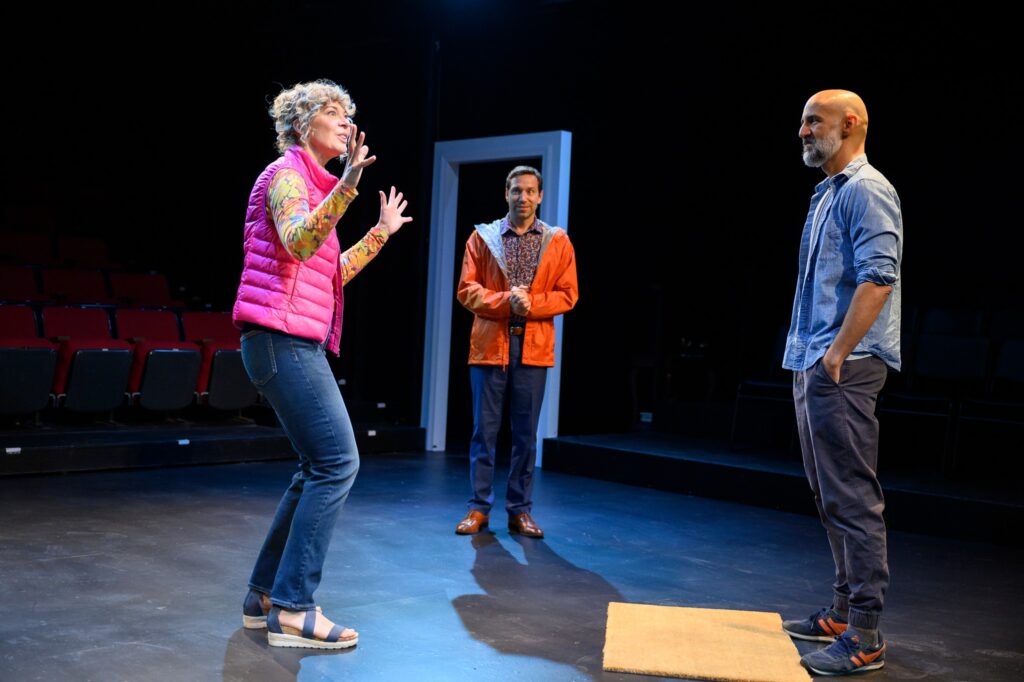
‘The Ding Dongs’ — Written by Brenda Withers. Directed by Rebecca Bradshaw. Costume Design by Camilla Dely; Lighting Design by M. Berry; Sound Design by Julian Crocamo. Presented by Gloucester Stage, 267 East Main St., Gloucester, through August 27.
By Shelley A. Sackett
We’ve all been there. That split second when we realize that all may not be as it seems, that we have misread a vital clue and that all is about to go south. The Ding Dongs, in production at Gloucester Stage through August 27, takes that moment and straps it to a steroid drip.
Don’t be put off by the title, as I almost was. (Is it a tribute to Hostess? To a bebop group? To the comedic wrestling duo?) The Ding Dongs will keep you on the edge of your seat for its entire 75 minutes from lights up to fade out and leave you dying to talk about it to anyone within earshot.
When is the last time theater had that kind of visceral effect?
The action starts with — what else — a couple ringing the doorbell of a suburban single-family home. Inside, the owner Redelmo (the always magnetic Neal Nacer), pauses and runs his hand over his shaved head as if some sixth sense warns him against answering the door.
From the get-go, there is something awry with Natalie (the mesmerizing Erica Steinhagen) and Joe (the superbly flexible Karl Gregory). Natalie is dressed like soccer mom Barbie and her husband Joe looks at home in his orange hooded windbreaker and fitted mod shirt. They present as any ordinary, if unfashionable, couple might, a little ditzy perhaps (another meaning of “ding-dong” is dingbat), but otherwise innocuous.
Natalie is the more forceful, immediately establishing that Joe grew up in Redelmo’s house and that they would love to come inside and take a peek at the old homestead. Joe is the more affable, taking his cues from Natalie and speaking only when she opens that door and invites him into the conversation.
Uncomfortable and increasingly suspicious, Redelmo tries to field their barrage of questions and reveal as little about himself as possible. Yet his politeness and graciousness are no defense to the couple’s verbal bombardment, and they steamroll right over the doomed deed holder’s threshold.
Once inside, all semblance of ordinariness vanishes. The couple launches their assault in earnest, cajoling, beseeching and threatening Redelmo. Natalie is equal parts pit bull prosecutor, evil enchantress and comical talk show host. Joe plays her foil, good cop to her sinister, slightly unhinged one.
The exchanges can be funny, but the overlay of menace and chaos erases any possibility of the audience feeling comic relief. These two are world-class black widow creeps, and Redelmo with his social graces and timidity, is no match for them.
Soon, their unsettling stories turn more sinister, violent and threatening. Their past is revealed, including a dark chapter involving home invasions, violence, disruption and dislocation. The two are verbal quick-change artists, feigning innocence one minute, wielding machetes the next.

In this boxing match of words and wit, Redelmo is outperformed and outnumbered and no amount of fancy footwork is going to save him from the blows that will eventually corner and pummel him into submission.
Unexpectedly, the doorbell rings again and large boxes addressed to the couple begin arriving. At this point (and not until), Redelmo wakes up to the fact that these two are not visitors who can be reasoned with and will eventually get the message that he wants them to leave. These are ruthless, deranged home invaders who play by alien rules and carry baggage far more unsettling than whatever might be in the avalanche of boxes squatting in his living room.
Abruptly, his house has gone from a calm, suburban home to a cross between Pee Wee’s Playhouse and Regan’s bedroom in “The Exorcist,” and Redelmo reels at the heightened stakes.
Natalie continues, now claiming that the house really belongs to Joe because, after all, he has priority in the chain of deeds, having lived there well before Redelmo “owned” it. In fact, they argue, to an outside observer, it is Redelmo who would be considered the squatter, not them.
“The simplest explanation is always the best, even if it isn’t the truth,” she says. Like wolves closing in on common prey, Natalie and Joe encircle Redelmo, smelling his fear and tightening their grip.
And then, things get even twistier and more disorienting until by the play’s sudden end, neither the actors nor the audience is really sure who’s who and what’s what. Like a huge pot put on a flaming stove, this play simmers for a long time until you wonder if it will ever reach boiling point. When it finally does start to roil, however, there is no lid heavy or strong enough to keep it from boiling over, like poor Mickey’s cauldron in “Fantasia’s” famous “The Sorcerer’s Apprentice.”
Playwright Brenda Withers has written a riveting, thought-provoking, timely play that receives a must-see, first-rate production under Rebecca Bradshaw’s crisp direction. Sound designer Julian Crocamo masterfully reflects the jerkiness of mood by subtly swinging from the sweetness of harmony to the menace of dissonance.
Setting the stage as a theater-in-the-square with four bays of seats gives the illusion of a boxing arena. It also allows Bradshaw and lighting designer M. Berry to take full advantage of a set that affords the audience a different perspective by slight shifts in position and luminosity. A few steps to the left or right and the focus can swing from an actor’s action to their reaction, giving the audience an entirely different perspective on the same situation.
With “The Ding Dongs,” Withers has created a sophisticated, multi-layered, complicated microcosm whose effects linger long after the play’s dramatic end. She subtitled her play, “What Is the Penalty in Portugal? a meditation on homeland security,” and she gives a clue as to her intention in writing it in a recent interview.
She had started thinking about land and property after reading an article about a skirmish in the Middle East. She thought about gentrification, the displacement of humans around the globe, and what makes a home a home.
She also thought about civility and how far we’ll let people get in order to maintain good manners. “What happens when you finally push back on someone and say, ‘These are actually my boundaries’ or ‘This is what’s making me uncomfortable.”’
This is not a “feel good” kind of play. Its laughs are funny but not funny. The manipulation, aggression and sense of helplessness are palpable and contagious. Those of us who think we may be inured and resigned to the realities of living in a macroworld where rules and truth are arbitrary will be further disheartened by this up close and personal micro-encounter with its nefarious day-to-day consequences.
It is, however, an important play with a timely and important message that should be seen and discussed. That Gloucester Stage’s production is an artistic bases loaded home run is icing on the cake. For tickets and information, go to: https://gloucesterstage.com/

